Air travel has become an essential part of our lives, allowing us to reach our destinations quickly and conveniently.
However, if you are traveling with certain items, such as propane, you may need clarification on whether you can bring them on board.
Propane is commonly used for camping, grilling, and heating, so knowing the rules and regulations regarding flying with propane is important.
Due to safety considerations, flying with propane in checked or carry-on luggage is normally forbidden.
An empty propane container thoroughly cleaned of any remaining gas may be accepted in checked baggage.
In this article, we will answer the question, “Can you fly with propane?” and provide the necessary information to ensure a smooth travel experience.
Can You Fly With Propane?
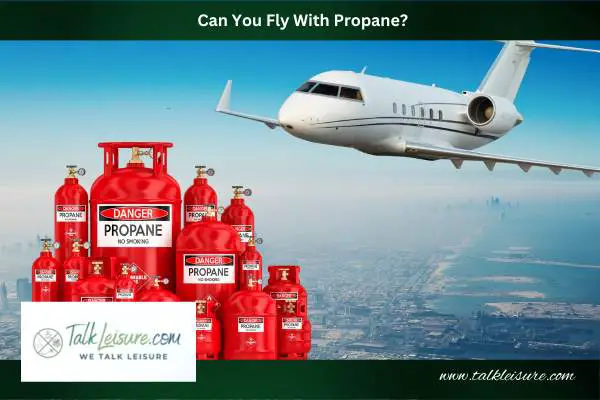
Flying with propane is generally prohibited in checked baggage or carry-on luggage due to safety concerns.
Propane is a flammable gas that poses a risk of fire or explosion if mishandled.
Airlines prioritize passenger safety and adhere to strict regulations set by aviation authorities, prohibiting transporting hazardous materials, including propane, onboard aircraft.
You must familiarize yourself with the Transportation Security Administration (TSA) guidelines and your airline’s specific policies regarding prohibited items.
These regulations are in place to protect passengers and crew members and ensure air travel’s overall safety.
If you need to transport propane for camping or other purposes, it’s advisable to purchase propane at your destination rather than attempting to bring it on the plane.
Many camping and outdoor stores and gas stations sell propane cylinders, making it convenient for travelers to purchase what they need upon arrival.
Sometimes, if you have an empty propane container purged of any residual gas, it may be allowed in checked baggage.
However, contacting your airline in advance is crucial to confirm their policies and procedures for transporting empty propane cylinders.
Where To Pack Propane (Carry-On Vs. Checked Luggage)?
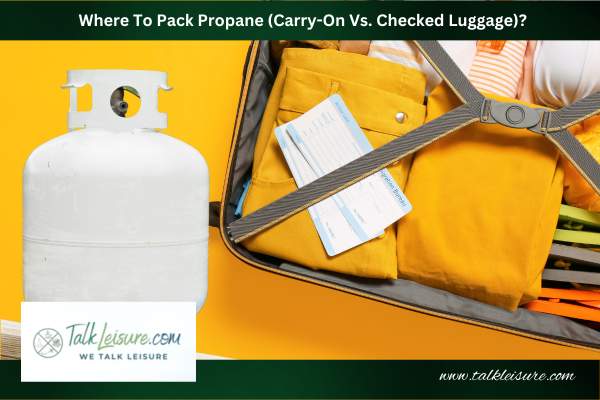
When flying with propane, you must familiarize yourself with the airline policies to ensure a smooth and hassle-free journey.
Carry-On Luggage
Most airlines prohibit carrying propane tanks or other flammable gas cylinders in carry-on luggage due to safety concerns.
These items are considered hazardous materials and can pose a risk if mishandled or damaged.
Checked Luggage
Propane tanks are typically allowed in checked luggage, but some restrictions and guidelines must be followed.
Many airlines allow empty or newly purchased/unopened propane tanks in checked luggage as long as they are properly sealed, empty of fuel, and free of odors or residue.
Some airlines may have specific packaging requirements for propane tanks in checked luggage, such as placing them in a sturdy container, wrapping them in absorbent material, or securing them inside a protective bag.
It’s important to declare the propane tank at the airline check-in counter and follow any instructions or additional screening procedures the airline staff provides.
What Are The Airline Policies On Flying With Propane?

Airline policies on flying with propane may vary, so it’s crucial to check with the airline you are traveling with.
Here are a couple of examples of airline policies regarding propane:
Delta Air Lines
Delta allows empty propane cylinders in checked baggage as long as they are clean and dry and demonstrate no signs of leaks.
Partially filled cylinders are not permitted.
It is advised to contact Delta for specific guidelines and restrictions.
United Airlines
United Airlines allows empty, cleaned, and properly sealed propane cylinders in checked baggage.
Partially filled or pressurized cylinders are strictly prohibited.
It is recommended to check United Airlines’ website or contact their customer service for detailed instructions.
These are just a few examples, and policies can change over time, so it’s essential to stay informed and check with your airline before traveling.
Safety should always be the top priority when handling and transporting propane cylinders.
What Are The TSA Regulations and Restrictions Regarding Propane?

When flying with propane, it’s important to know the guidelines the Transportation Security Administration (TSA) set.
The TSA regulates what items are allowed or prohibited on flights to ensure the safety of passengers and crew.
Here are some key points to consider:
Prohibited Items
The TSA prohibits certain types of propane containers on both carry-on and checked baggage.
This includes propane tanks larger than 16 ounces (approximately 1 pound) or 1,000 BTU per hour.
It’s essential to double-check the size and capacity of your propane container before traveling.
Permitted Item
The TSA allows small propane canisters of less than 16 ounces (approximately 1 pound) or 1,000 BTU per hour.
These canisters are typically designed for camping stoves and portable grills.
However, checking with your airline and the TSA before traveling is always best to ensure your propane container meets its specific regulations.
What Are The Federal Aviation Administration (FAA) Rules On Propane Transportation?

When it comes to flying with propane, it is crucial to follow the Federal Aviation Administration (FAA) regulations in the United States.
Here are some key points to note:
Prohibited Items
The FAA strictly prohibits the transportation of propane tanks and cylinders in both checked and carry-on baggage.
This is due to the flammable nature of propane and the potential risks it poses during air travel.
Exceptions
There are some exceptions to the prohibition on transporting propane. Small camping stoves and fuel containers that contain less than 16 ounces of propane may be allowed in carry-on baggage as long as they are empty and do not contain any fuel residue.
You can visit the FAA’s official website here for more information on FAA regulations and guidelines for transporting hazardous materials.
Safety is a top priority in air travel, and it is essential to follow these regulations to prevent any potential risks or hazards on the plane.
Why Would Someone Carry Propane On An Airplane?

While the transportation of propane on airplanes is generally prohibited, there may be valid reasons why someone would need to carry propane.
Here are a few scenarios where this might occur:
Outdoor Activities
Some outdoor activities, such as camping or hiking, require portable propane tanks for cooking, heating, or lighting.
A propane tank will be helpful to boil water when you feel like enjoying a nice cup of tea during camping.
In such cases, individuals may need to transport propane cylinders to their destination.
Remote Locations
In remote locations where propane may not be readily available, transporting propane cylinders via airplane could be a practical option.
This is especially true for areas with limited access to other fuel sources.
Professional Use
Certain professionals, such as photographers or filmmakers, may require propane-powered equipment.
Transporting propane cylinders on an airplane could be necessary to support their professional activities.
It is important to note that even if these scenarios apply, proper safety measures and compliance with aviation regulations should always be followed.
When in doubt, it is best to consult with the airline and adhere to their guidelines to ensure a safe and hassle-free travel experience.
What Are The Tips For Traveling With Propane Safely And Legally?
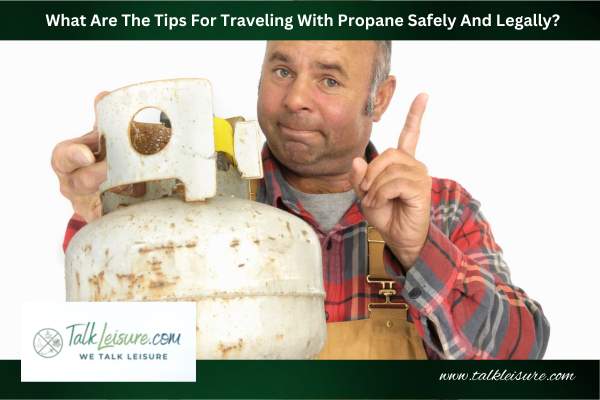
When traveling with propane, following safety guidelines and complying with regulations is essential.
Check Airline Regulations
Before traveling, check with the airline about their specific regulations regarding propane.
Some airlines may allow small propane cylinders for camping stoves, while others may have strict restrictions.
Store Properly
If you need to travel with propane, ensure it is properly stored in a well-ventilated area away from ignition sources.
Keep it in a sturdy container and tightly sealed to prevent leaks.
Follow Transportation Regulations
Familiarize yourself with transportation regulations for propane, both for air travel and other modes of transportation.
Be aware of any restrictions on the size and quantity of propane you can carry.
Inform Transportation Authorities
If you are traveling with propane, inform the transportation authorities in advance.
They can provide you with specific guidelines and ensure a hassle-free journey.
Be Prepared
Carry important safety equipment, such as a fire extinguisher, and familiarize yourself with the proper use of propane equipment to handle any emergencies that may arise.
It’s important to note that regulations may vary depending on the country and airline you travel with.
Always check with the relevant authorities before your trip to ensure compliance.
What Are The Alternatives To Flying With Propane?
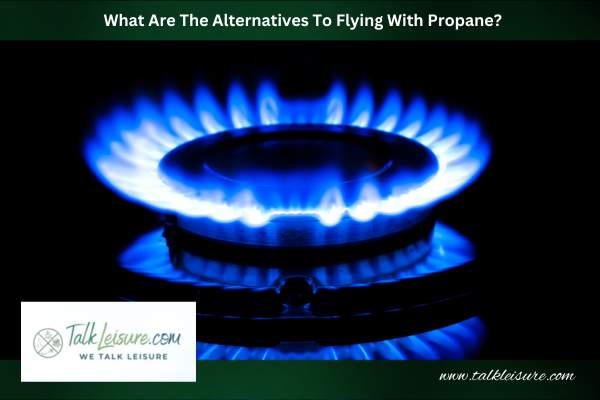
If flying with propane is not an option, alternative solutions exist.
Purchase Propane At Destination
Instead of flying with propane, you can consider purchasing it at your destination.
Many camping and outdoor stores carry propane cylinders, allowing you to buy what you need upon arrival.
Rent Equipment
If you are going on a camping or outdoor excursion, consider renting propane equipment at your destination.
This eliminates the need to transport propane and ensures a safe and hassle-free experience.
Use Electric Or Gasoline-Powered Alternatives
You may consider using electric or gasoline-powered alternatives to propane equipment, depending on your needs.
Electric grills, stoves, and heaters are widely available and can be a convenient option.
Explore Local Regulation
When traveling to a specific destination, research local regulations regarding propane use.
Some locations may have restrictions or alternative fuel options available.
By exploring these alternatives, you can still enjoy your outdoor activities and ensure a safe and convenient experience without the need to fly with propane.
What Are The Safety Concerns Associated With Flying With Propane?
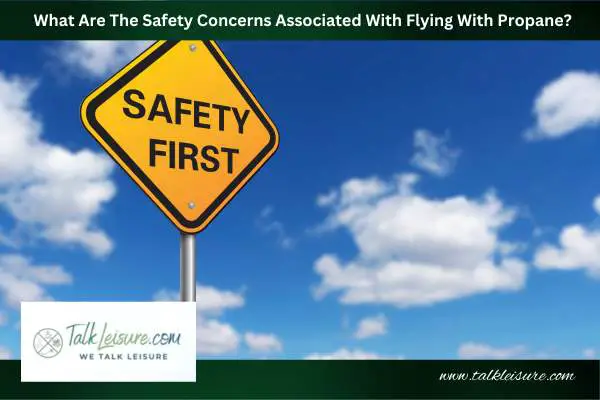
Flying with propane can pose a safety risk due to the flammable nature of the gas.
Airlines and transportation authorities have strict regulations in place to ensure the safety of passengers and crew.
Fire Hazard
If improperly handled, propane is highly flammable and can pose a significant fire risk.
In the event of a leak or ignition, propane can cause explosions or fires on board the aircraft.
Equipment Compatibility
Propane tanks and cylinders are not designed for air travel and may not meet the safety standards required for aviation.
There is a risk of rupture or leakage during the flight, which can be dangerous.
Pressure Changes
Airline cabins are pressurized, and changes in pressure during the flight can affect the stability of propane containers.
Rapid changes in altitude can cause propane tanks to explode or leak.
Final Thoughts
In general, it is not recommended to fly with propane due to the safety concerns associated with its flammable nature.
Most airlines and transportation authorities have strict regulations that prohibit or restrict the transportation of propane on board.
It is important to prioritize safety and comply with the regulations to ensure a smooth and secure journey for everyone involved.
If you need to transport propane for camping or other purposes, it is advisable to find alternative transportation modes specifically designed for carrying propane.
Always check the local regulations and guidelines to ensure compliance and safety.
Remember, safety should always be the top priority, and it is best to err on the side of caution when flying with potentially hazardous substances like propane.











